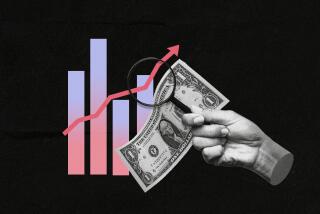What Does It Take To Be Rich?
- Share via
So your net worth is $1 million.
Are you rich? Can you stop worrying about money?
These questions evoke visceral responses from people, from disbelief--as in, Not even close! to, well, disbelief, as in, “Of course!”
Million, schmillion, some say. It takes a lot more than $1 million to be truly rich today, and to stay rich.
They have a point. To match the lifestyle of the average 1925 millionaire would take nearly $10 million in net worth today because inflation has gnawed away the value of a dollar like a termite through a Southland beach house.
Prosperity can worsen that erosion even in low inflation times such as these: Millionaires in Aspen, Colo., complain that billionaires are driving up home prices to unaffordable heights, while luxury houses in Palo Alto are snapped up before the for-sale signs are even stuck in the manicured lawns.
Worth magazine, the self-styled personal finance guide to the rich, recently estimated that you need a fortune of at least $50 million to get truly customized financial service at most banks, trust companies and financial planning firms today.
No wonder so many feel shouldered aside by others wealth.
Native Oklahoman Maria Fotopoulos thought a six-figure income meant real money--until she moved to Los Angeles. Fotopoulos, a public relations professional, and her financial consultant husband are renting an apartment in Brentwood while they reel from home-price sticker shock.
“If 95% of Americans have incomes under $126,000, I continually wonder who buys all these houses in L.A. that start at $500,000 for a tear-down--or what would cost $30,000 in Oklahoma City,” Fotopoulos said. I can sure tell you that falling in the 95% zone doesnt make me feel like Im doing much more than getting by if I cant even contemplate buying a house.”
In fact, almost as many Americans making $85,000 tell pollsters they arent making as much money as they “need” as do those making $35,000, according to Juliet B. Schor, a Harvard professor who wrote “The Overspent American: Upscaling, Downshifting and the New Consumer.”
And the more you make, the more you think you need: Even a $1 million nest egg at retirement may not be enough for a baby boomer now earning $85,000 a year, given inflation and longer life spans.
But other readers no doubt will argue we need another point of reference.
Tear-downs do, after all, still cost $30,000 in Oklahoma City, and the average home in the U.S. costs less than $200,000. The median household income in America is about $47,000. Thats the equivalent of what a lowly bank CD would pay in annual interest on $1 million.
Which means many people conceivably could retire tomorrow on $1 million and, with low-risk investments, live very well indeed. Some no doubt could do so on the interest earnings of even $500,000.
Widen your aspect ratio a little further, and the argument that $1 million isnt much becomes almost absurd: With 2 billion people in the world living on less than $2 a day, $1 million is an inconceivable sum.
“Most of us live high on the hog compared to everybody else on the planet,” says Sherman Oaks resident Ray Hoese, whose family was considered rich in their native southern Louisiana town because they lived in a brick house while others lacked indoor plumbing.
So why wouldnt $1 million feel like enough to many of us? Partly, its because costs of living have risen along with incomes. Getting ahead seems to require a two-income family; the Census Bureau tells us that dual earners are among the households making more in real terms than 20 years ago, but one-income families have lost ground.
Thats Hoeses position. “I make a good living, but because of where I live--Southern California--and the fact that my wife stays home to raise and home-school our kids means we still struggle from paycheck to paycheck,” said Hoese, a marketing communications manager who lives in Encino.
Whether a $1-million net worth feels like a lot may also depend on the form that wealth takes.
Say you have a house worth $400,000, and 401(k) and other retirement savings totaling $600,000. Youre 52, or thereabouts. If you tried to live just on the portfolio, and you earned 10% a year on that money in capital appreciation and interest, your spendable income would be about $60,000 a year.
You might well be OK with that level of income, plus eventual Social Security income. But if you still face child-rearing expenses, or must help care for an aging parent, that income might not be enough to maintain the lifestyle youd prefer.
And each year that $60,000 would be worth less, after inflation. Even with todays low inflation your buying power would be cut by about half in 30 years. Whats more, if your investments stumbled, you could face a sudden cutback in your income or risk running out of money.
Certainly, you could learn to live on less by cutting back on your lifestyle. But we also live in the most prosperous country during the most prosperous era the world has ever seen. In Southern California were surrounded by even more stunning wealth, made from movies and oil and “dot.coms.” We see images on TV of lifestyles that previous generations could only glimpse from afar. Those images tell us not just what others have, but shape what we believe we need, Schor notes.
And our expectations have risen dramatically over the years. In 1950, the average new house was 1,100 square feet; today its twice that, and our families are smaller, yet we still feel cramped.
Perhaps its all the stuff we put in the house. Fifty years ago, TV sets were a luxury, as was a second car, and you housed the latter in a carport or small garage--not the three-car wonders that are almost standard today.
Back then, you got your coffee at home or at a diner; a $3 cappuccino was beyond comprehension, even to the few who could pronounce it.
In the end, of course, what it takes to feel “rich” today, or even merely comfortable, is largely a matter of personal perception.
Kathy Shoeny is a single mother in El Monte whose income drops her squarely into the ranks of the working poor by government standards. But she owns a small home, a car, two TVs, a VCR and a computer. Her two children have health insurance and decent schools. She has a job decorating cakes at a bakery.
She occasionally dreams about what her life would be like if she won the lottery--an impossibility, she says, because she never plays--but has concluded shes already pretty rich.
“Ill admit to feeling some pangs of jealousy when I read about wealthy people and their problems, “ Shoeny said. “However, what I mostly feel is incredulity.
More to Read
Inside the business of entertainment
The Wide Shot brings you news, analysis and insights on everything from streaming wars to production — and what it all means for the future.
You may occasionally receive promotional content from the Los Angeles Times.










